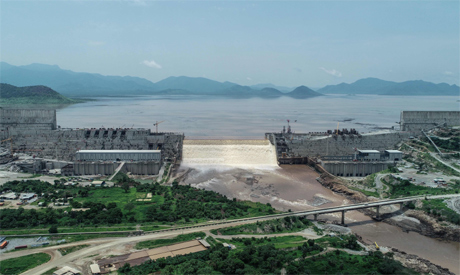Date: Monday, 10 August 2020

A Sudanese government source said Khartoum refuses to return to the African Union (AU) brokered talks without a commitment by Addis Ababa to an agreed upon agenda focused on the rules of filling and operating the dam.
He added that the AU has suggested a return to negotiations to discuss the contentious points, but the proposal was rejected by Sudan.
Renewed AU-sponsored talks over the multi-billion-dollar project were launched last month between the three countries, and the US and the EU attended as observers. The talks stumbled last week after Egypt and Sudan called for the suspension of meetings for internal consultations after Addis Ababa proposed a new draft on filling guidelines.
Egypt said the draft proposal put forward by Ethiopia lacked guidelines on the operation of the dam, any elements indicating a binding deal, or a legal mechanism to settle disputes.
Sudan had threatened last week to withdraw from the talks if Ethiopia insisted on linking an agreement on the dam’s filling to a deal on sharing the waters of the Blue Nile.
Sudanese Irrigation and Water Resources Minister Yasser Abbas said in a press conference on Saturday that he was “surprised” by Ethiopia’s proposal on the water shares, which he described as “dangerous.”
He said his country has asked to postpone the latest round of negotiations for a week for consultations and in objection to Ethiopia’s inconsistent stances during talks.
Abbas also announced the formation of a committee tasked with examining the possible future scenarios.
Meanwhile, Othman Mostafa, a member of the Sudanese negotiating team, told Sky News Arabia that Ethiopia’s inclusion of water-sharing in the talks was a deviation from the Declaration of Principles (DoP) signed between Egypt, Ethiopia and Sudan in 2015.
He said most of the technical aspects in the agreement have been settled; yet the main obstacles remain in the binding nature of the agreement, which Ethiopia rejects.
Mostafa said that a binding agreement is the only means of ensuring the safe operation of the dam and to avoid any possible negative consequences, especially on Sudan’s Roseries dam, which is located 100 kilometres away from the GERD.
Ethiopian foreign ministry spokesman Dina Mufti said last week that his country cannot sign a binding agreement that requires it to release specific quotas of water from the dam to downstream countries Egypt and Sudan.
He did, however, stress in a press conference on Friday that Addis Ababa does take into account Egypt's and Sudan’s concerns regarding periods of drought, yet cannot decide on the matter at present.
He also said that attempts by the US and the World Bank to “pressure” Addis Ababa into signing what it described as a “lopsided” deal would damage tripartite negotiations with Egypt and Sudan.
Addis Ababa announced last month that it had achieved its first-year target for the filling of the dam’s reservoir due to the rainfall season. The move was condemned by Cairo and Khartoum, both of whom sought a legally binding agreement before the dam’s filling.
Egypt has sent a letter on Wednesday to South Africa, which currently chairs the AU, reaffirming Cairo’s rejection of Ethiopia’s “unilateral” initial filling of the GERD and the new Ethiopian draft proposal.
In its letter, Cairo said the Ethiopian proposal, presented on Tuesday, violates directives by the AU in July calling on the three countries to swiftly finalise a legally binding agreement.
The nearly completed $5 billion dam has been a source of contention between the three countries. Cairo fears the project will significantly cut its crucial water supplies from the Nile River, while Sudan fears it could endanger the safety of its own dams.
Ethiopia says the massive project, which it hopes will make it Africa’s largest power exporter, is key to its development efforts.